Quite Spectacular
Reviews of books I've found to be really rather quite spectacular
A Little Something Different by Sandy Hall

This book was sooooo cute! It wasn't sickly sweet or terribly twee - and boy could it have been given the premise - just 'aww' inducing, Joey Potter half smile producing, cute. Sandy Hall managed to walk that fine line and maintained the right tone throughout. The whole thing was like one big wink really. In fact, the tone kind of reminded me of the opening track of the 500 Days of Summer soundtrack.
As the title suggests, the format to A Little Something Different is a little something different. Such a simple idea but executed incredibly well. In the wrong hands, this could've been a mess. Sometimes even two points of view can become confusing if the author doesn't have control right away but somehow, Sandy Hall managed to make maybe 9 (?) - or more - points of view sound completely different! I loved Charlotte and Victor because they brought the realness and I feel I went on a similar journey to them in terms of my feelings toward Lea and Gabe. Professor Inge was more of a romantic but her point of view was definitely needed.
As for Lea and Gabe. Well...some couples are too cute (see: Brangelina, Blair + Seth Cohen, Zoe Kravitz + whoever she is with), some couples don't register (see: most real life couples and d list celebrity pairings), and some couples are nauseating (see: Kimye, Charlize + Sean). Lea and Gabe started off a little nauseating (I was so on Victor's side in the beginning, shaken not stirred) but by the middle, when they weren't even sure what they thought of each other, they turned into a pair who don't really register on anyone's radar. Finally, by spring semester (or Lent term as we call it over here) you just had to give in and accept their cuteness. I kind of wish we knew more about Lea but it was good to witness Gabe's story unravel and his character evolve (although if you read closely, you can pick up the signs).
Not much is given away in terms of place and time, which I thought was a nice touch as it helps add to the universality of the story. There's a lot of close friendships and tight families, comfort food, and Starbucks, which made the story feel really warm and fuzzy - but again, I hasten to add, not in a sickly sweet kind of way. Oh and I loved that it was set in college! We need more college stories that don't rely on the good girl falling for the bad guy trope.
Overall, A Little Something Different did just what it said on the tin. It wasn't too long and it flowed well with snappy dialogue, some chuckle inducing moments, and a bit of whimsy thrown in for luck. A great debut from Sandy Hall!
The Rosie Effect by Graeme Simsion

The Rosie Project was one of my favourite reads of the year, so I couldn't believe it when I saw The Rosie Effect on Netgalley. After finishing The Rosie Effect, I can safely say that Don is still tied with Ryan Dean West of Winger as my favourite character of the year.
I must say, if you haven't read The Rosie Project then I suggest you drop everything and get a copy before starting The Rosie Effect because it is full on Don and if you're not familiar with Don, well...just read the first one first. However, if you are a Rosie Project fan, you will definitely not be disappointed with the latest instalment.
Like its predecessor, The Rosie Effect is full of warmth and love and hilarity but I think it's a little more serious due to the nature of Don's latest project. There's plenty of shenanigans but these often revealed truths about those of us who hide behind the social dances that Don just can't get down with.
There's plenty to chew on about the first year of marriage and compromise, which doesn't come naturally to Don. There's also lots to think about with regards to families and friendships- broken and unbroken, old and new. I loved Dave and Sonia and, of course, Gene and all the trouble he brings in his wake. I also liked that we are given a glimpse into expat life, which is something more and more people can relate to these days as we move around the globe, and the good and bad of starting life in a new and sometimes confusing environment. Similarly, I thought the 'modern woman - having it all, doing it all' part of Rosie's story was really interesting and I'm sure many women will be able to relate to Rosie's predicament. Having said that, I would have liked to see even more Rosie because she's a wonderful character.
Overall, I really enjoyed The Rosie Effect, mostly because of the charming characters. Don's story could go on and on. I'm sure I'm not the only one itching to know what happens next with you-know-who!
Let's Get Lost by Adi Alsaid
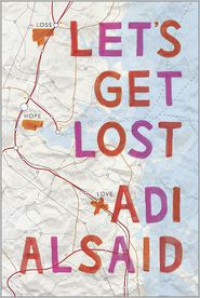
I kept seeing the cover of Let’s Get Lost popping up all over the blogs I follow – whether on Top Ten Tuesday or Waiting on Wednesday – so when I saw it was available on Netgalley for us UK folk I just had to request and keep my fingers crossed. I will always have a soft spot for road trip novels and Let’s Get Lost certainly didn’t disappoint.
The opening chapter was absolutely beautiful and hooked me straight away. It’s quite difficult to create an authentic yet instant romantic connection between two characters but Leila and Hudson’s meeting was near enough perfect. It wasn’t too sweet or sappy or unbelievable, which was nice. I always think the litmus test for these kinds of set-ups is: would you want this to happen to you? In this case, I can most certainly answer in the affirmative.
However, the dreamy romance doesn’t last long as we’re dragged into a high energy Thelma and Louise type section. The subsequent chapters take on different tones as Leila weaves in and out of lives whilst she snakes her way up to Alaska. I really liked the structure with each character having their own self-contained section with Leila (bookended with lovely illustrations and correspondence). With the seemingly never-ending amount of series and sequels and whatnot out there, it was nice to have characters who said ‘goodbye’ to one another because that’s life. More often than not people come in and out of our lives for a short time, sometimes they have a profound effect, sometimes not so much, and Let’s Get Lost portrays this beautifully.
As for the characters themselves, I loved Leila – the adorable, pocket-sized ball of goodwill and adventure who I couldn’t help but picture as a younger Mila Kunis type. She’s also a ‘fixer’ but not in an annoying way. Yet there was also a great maturity to her character due to circumstances that were slowly – painstakingly – unravelled throughout the story. All of the people she met along the way were memorable but my favourite was Sonia. There was just something so real and heartbreaking but simultaneously uplifting about her character. I would love to read her story.
Overall, I loved Let’s Get Lost with it’s dreamy, indie like vibe. I couldn’t help but have that Edward Sharpe and The Magnetic Zeros ‘Home’ song playing in my head every time Leila set off on her travels. This is certainly not just a summer read – I know I’ll probably re-read it at some point - but if you’re heading off on your own travels soon, I would recommend you take a copy of Let’s Get Lost with you.
Friendship by Emily Gould
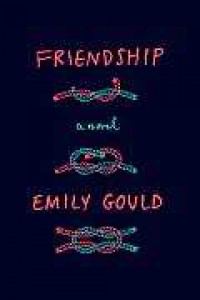
This One Is Mine by Maria Semple
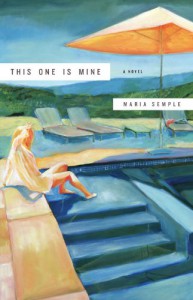
I ended up liking This One Is Mine but it was definitely a fight to get to that stage! I had to persevere through a rocky first third and a strange middle but it was all worth it for the finale. The last few pages were quite beautiful.
The characters are all pretty horrid. Violet is a flaky and indulged ex TV writer; David is a superstar music manager with a huge ego and a temper to match; Teddy is a carefree, kind of racist, recovering addict; and Sally takes gold-digging to a whole other level. The only kind of likeable characters are Dot and her nanny. Oh and David's assistant Kara. However, as a name nerd, I must tip my hat to Maria Semple - all the names were great. I mean, how cute is Dot?! Anyway, we all know and understand that characters don't have to be likeable - it just means that their journey has to be that more interesting. We get there in the end with this motley crew and every time you think one of them can't get any worse, they have a human moment, and balance is restored.
The main theme of the story is the old "you don't know what you've got 'til it's gone" and "the grass isn't always greener" and so on and so forth. Yes, they are age old adages but we don't really seem to learn do we? Especially when we seem to have everything we've ever wanted. Violet's misadventures also represents the restlessness of the rich. David pretty much bleeds money and Violet wants for nothing. Except there's no such thing. You can never have everything, so Violet feels the need to scratch this itch and take a walk on the wild side. Ownership is another theme, as can be deduced from the title. Every character wants something that's solely for them. Even Dot regularly squawks 'want dat'. On the other side, there's dependency. Sally's whole plan is to get out of debt and stop relying on her brother. Admirable. Except she wants a rich husband to save her even though she has her own business and is clearly bright enough to make something of herself on her own.
The best scenes in the book are the chaotic ones such as the wedding, which was hilarious. I could picture it vividly. One thing I wasn't so keen on was the racial slurs. There seemed to be a lot in the first part but luckily this didn't continue for the whole novel. I was close to putting it down at one point because I just didn't see what value the slurs added to the story. Finally, I loved all the Sondheim - everybody needs some Stephen Sondheim in their life. The writing is kind of like a Sondheim composition. I was playing Marry Me A Little the other day and thought of This One Is Mine. On the surface, the song sounds normal but when you actually play it - like most Sondheim songs - it is actually a lot more complicated and intricate than you expect. There's a scene where Dot is trying to sing along to Company and trying to keep up with all the different parts and that's exactly how the reader feels when tackling this novel.
So, if you like you stories offbeat and filled with challengingly unlikeable characters, pick up a copy of This One Is Mine.
Past The Shallows by Favel Parrett
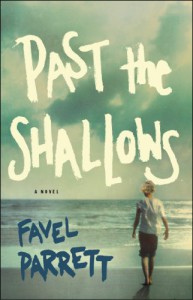
Knowing Favel Parrett is Australian meant that I had exceedingly high expectations for Past The Shallows. A little unfair perhaps but I have yet to come across an Australian YA novel that I dislike. I am pleased to announce this statemement is still true. Past The Shallows is hauntingly beautiful and I'm still thinking about it now.
As you can probably guess from the synopsis, the story is bleak. There is a great deal of loss and hopelessness throughout - the whole book is weighed down by a heavy, almost inescapable sadness. Then there was Harry. There's a reason people always talk about wanting to think like a child again because even those who are forced to grow up far too quickly can lose themselves in childlike delight and fantasies. Harry was a small ray of light in a terribly grim story. It is because of Harry that Past The Shallows also highlights the kindness of strangers. Harry's interactions with George and Jake are bursts of gold. I'm still not completely sure why George took to Harry so much (I don't think it was anything sinsister either, so don't worry about that). I thought perhaps he was friends with Harry's granddad or another member of the family. Either way, I loved their time together and just like Harry, I felt relieved to have a small respite from the oppressive nature of the father. It's a testament to Favel Parrett's talents that the father, whilst saying very little, and not being around all that much, was such a dark presence, constantly upsetting the balance.
With regard to the other characters, it's impossible to feel sorry for Miles, the middle man, literally. Miles is the Atlas of the story, bearing the weight of responsibility for his little brother, worrying about his big brother, along with the expectations his father holds for him. Instead of being allowed to explore and be the child that he is, like Harry and his rich friend of sorts, Miles has come of age and must work on the boat, putting himself in danger both from the sea and the temperments of his father and colleague Jeff (a brutal, heartless man who I despised - see, once again, being able to invoke such emotions in reader is a testament to Favel Parrett's writing). Many of the scenes between Miles and Harry were heartbreaking - particularly when the father took a turn for the worse.
The prose was very simple. Much was left unsaid. However, this was part of the beauty of the novel. On the one hand, it reflected the pure, simple, and wholly good nature of Harry. On the other hand, it reflected the sadness and emptiness felt by all those left in the wake of the father's moods and the mother's death. Similarly, it also mirrored the setting and the lives of those in the fishing huts and caravans in the town.
Being a story about fisherman, naturally the sea is also a character in Past The Shallows. At times, generous and giving, at other times a playground and a means of escape. However, it is also something that can be more fearsome and overwhelming than the father. I remember watching a surfing documentary and one of the Hawaiian coastguards (or something similar) said that from a young age, in Hawaii, the children are taught to respect the ocean as much as they enjoy it. I kept on remembering this line whilst reading Past The Shallows, particularly in light of the father's and Jeff's behaviour.
Overall, there are plenty of other themes in the novel such as, guilt, grudges, loneliness, friendship, escaping vs. running away. Far too much in this little book to dissect in a short review. However, I would highly reccomend Past The Shallows. It is thoughtful and moving and will haunt you for days.
Remembrance by Theresa Breslin

The year is 1915 and the war has already gone on longer than predicted. Two sets of siblings become friends in the unlikeliest circumstances just before the realities of the war begin to permeate their lives. Focusing on the fighting and life back home, the story follows the friends through the thick of it and the aftermath.
Remembrance was stirring, thought-provoking, and heartbreaking. I rarely read anything about World War I - the last being The Last Summer by Judith Kinghorn - but this is definitely the most realistic and moving WWI novel I've come across. There's so much packed into it but it is all handled with such delicate sensitivity that you can't help but become absorbed.
I loved all of the characters. Each and every one of them just got to me. I loved Charlotte for her compassion and steadfastness; Maggie for her courage and fire; John Malcolm for his patriotism and bravery; Alex for his loyalty; and Francis for his heart. They all just seemed so real, which further enhanced the horrors they encountered.
Many themes were covered in Remembrance. The changing role of women in society was handled well, as seen through the eyes of Charlotte and Maggie as they threw themselves into work that previously would have been frowned upon. The breaking down of class boundaries was shown through the relationships - both romantic and platonic - between the friends and their families. Pacifism was handled extremely well through Francis's story and his thoughts on Just War theory (which I haven't encountered since my final year of university!). Patriotism and duty was explored through the actions of all characters, from Charlotte signing up to be a nurse, to John Malcolm and Alex's eagerness to enlist and defend their country. Also, poignantly, through the deaths of the soldiers nursed by Charlotte who wanted to know if they had fought the good fight. Finally, the shrinking world in terms of borders and other nationalities, with the diverse allied force comprised of soldiers from a number of countries - from India to Canada.
The pacing of the novel was beautifully executed, with each year of the war split off into different parts. This helped keep things as clear as possible because there was a great deal of information to digest and it might have been overwhelming without the parts. I loved the use of letters, particularly John Malcolm's letters home and Maggie's letters to Francis.
Overall, Remembrance was a wonderfully crafted novel. It is the perfect novel to read as a companion to this year's First World War Centenary programming and events.
Between The Lives by Jessica Shirvington
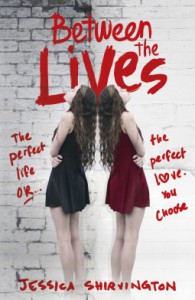
Sabine has always lived two lives - her Roxbury life and her Wellesley life, both of which are almost polar opposites. Each day, she has to go through the motions in Roxbury and then again in Wellesley. She calls the changeover the 'Shift'. However, an accident in her Roxbury life changes everything, causing her to consider sorting out the situation once and for all. She just has to decide which life she'd rather live forever.
Described as a YA Sliding Doors, I was immediately gripped by this interesting premise and the book certainly started with a bang. I found myself reading much more than I planned each evening thanks to the fast and furious pace and, of course, this perplexing premise. Unfortunately, it kind of fizzled out for me and didn't go in the direction I had expected. I assumed it would be in a similar vein to Teri Terry's Slated series (which I love) but it did not pan out that way. The 'fantastical' element - if you can call it that - took a bit of a back burner once the romance started.
In terms of characters, I couldn't really get on board with Sabine. I respect the name choice though. I empathised with her plight to begin with but she seemed to get lost from about halfway into the book. I understand that she was debating which life to choose but I found it very difficult to get in her head, even though the story was told in the first person. I didn't get Ethan much either but only because I felt like we weren't given the opportunity to get to know him. He just appeared suddenly and then next thing we know, he's everything. Even the explanation at the end didn't make up for the lack of development. I know it was supposed to be Sabine's story but if Ethan was going to be part of her life, he needed to be a little more formed. Overall, I think there were maybe too many supporting characters who were just there, standing around. I felt like there might have been more to Miriam and Lucy - friends of Wellesley Sabine - but their relationship was never explored. However, Roxbury Sabine's best friend Capri was nicely written. Also, why did Wellesley Sabine dislike her brothers so much? Maybe there should have just been the one brother, especially considering the end.
Then again, this is all down to personal preference. I like a character driven story but if you like a fast paced plot, you'll be pleased with this one. It does move quickly but the direction of the plot switches dramatically, so be prepared. As for what happened to Wellesley Sabine towards the end?! It seemed a little out of the blue and I'm not sure what to think about it. Was it shocking? Yes, definitely and I'm sure that was the intention. However, I can't help think that there might have been another way to propel Sabine's story forward. The whole project was a big one so perhaps I am asking for too much - two lives to flesh out, a fantastical/psychological element, and a romance is a lot to pack in to a 300- odd page book, so props to Jessica Shirvington for even attempting it.
Overall, I liked the idea and really enjoyed the first half but unfortunately I wasn't overly keen on the finale. I've tried to avoid giving away anything major here but there's a lot I want to talk about, so if you've read it, let me know!
The Geography of You and Me by Jennifer E. Smith

During a blackout in New York City, Lucy and Owen find themselves trapped in the lift. Despite living in the same building, the two have never spoken before but once they get to talking, there's no denying the spark between them. So they navigate the rest of the blackout together, pondering the big things and the little things. However, life happens and circumstances change, and the two find themselves whisked off to opposite sides of the world. However, they keep the spark ignited by exchanging postcards and allow fate to do the rest of the work.
The Geography of You and Me is a sweet and heartwarming contemporary young adult romance about how it's really the people that make the place and a testament to the fact that true friendship - and love - can survive the miles. It was a wistful and quiet read. After reading three of her other novels, I've come to realise this is Jennifer E. Smith's style and I very much like it. Fan for life here. Given the premise, this could have easily been fluffy and wishy washy, or mad cap caper style, or a steamy romp but I liked the way Jennifer E. Smith handled it. There was something more substantial to it - behind the themes and Lucy and Owen- that made it more than a poolside read, just like The Statistical Probability of Love at First Sight.
The actual story was very well paced as I didn't feel it dragged in any places. In fact, sometimes it went too quickly! I wanted to soak up more of Edinburgh and Lake Tahoe or even Prague (I must go to Prague. It's not even that far from here). Speaking of which, this book should carry a warning on the front: CAUTION. WILL IGNITE A SEVERE CASE OF WANDERLUST. Between them, Lucy and Owen visited and lived in such a great number of jealousy invoking places. The descriptions - particularly of the weather- were spot on for the places I've visited myself and made me want to visit the rest. However, there's a bit towards the end that sums everything up nicely, as Lucy realises that when you travel it's not what you bring home with you but rather what you leave in that place - a little piece of yourself. Obviously, this is made even better if you have someone to share it with.
The use of third person narrative really helped push the story along. I was thinking about the differences between first and third person the other day when writing about I'll Be There by Holly Goldberg Sloan. I realised many of the YA books I read are written in first person, which is great if you love the character (and I don't mean you have to like the character but there has to be something there) but if you don't, there's a danger the whole story can fall flat. I think third person worked particularly well here considering we were constantly flipping from Lucy in Europe to Owen in the USA. There's nothing worse than alternative points of view in the first person where both characters sound alike.
Anyway, returning to the story, I liked Owen and Lucy. Both were so lonely that you couldn't help but will them together again. Whether or not they were actually falling in love was debatable, which was great, although I'm sure it's safe to say they were very much in like. I'm not much of a fan of insta-luv so I enjoyed that this was a sloooow burner and the ups-and-downs of their relationship seemed much more realistic because of it. Basically, Lucy and Owen actually seemed like teenagers. It was nice to have the parents so involved in the plot too although I would have liked to see more of Lucy's brothers - I love twins in stories!
Overall, I was very much smitten with The Geography of You and Me whilst reading it and I think it is my favourite of Jennifer E. Smith's books (those I've read so far anyway). I would recommend this to fans of Sarah Dessen and Jenny Han, and those who like their summer stories with a little bit more behind the words. Oh and of course for those with itchy feet. So without further ado, I'm off to tinker with my own travel list.
Tease by Amanda Maciel

The summer before senior year, and senior year itself, is supposed to be the best of times. No such luck for Sara Wharton. When her classmate commits suicide, Sara and her friends find themselves facing criminal charges due to their documented, systematic bullying. Over the summer and as she starts school again, Sara works with her lawyer and therapist to contemplate what really happened and work out how big of a role she truly played in her classmate’s death. She must also deal with a fractured family, a non-existent friendship circle torn apart by the tragedy, and a town not willing to let her forget what happened, regardless of the final verdict.
Tease was most definitely a challenging read. Having read The Knife That Killed Me last week, it was quite interesting to read a story from the bully’s perspective. Like actors, I’m sure writers enjoy the challenge of writing ‘the villain’ but in life, there’s often no such thing as a clear cut ‘goodie’ or ‘baddie’. Amanda Maciel does a great job of showing the grey area that colours one of the most important topics concerning young people today.
I found the character of Sara to be complicated. Whilst reading, I often felt like I was fighting with her. I constantly wanted to shake her and say ‘GROW UP!’ but then she would say, or do, something that would make me sympathise with her and remember her age. Despite doing lots of grown up things, Sara was still only on the cusp of adulthood. I liked that Emma, the victim, was not a saint either. Even though Sara is meant to be an unreliable narrator, it was evident that Emma had issues. Emma was similar to one of those reality show characters that hover around a group of friends who clearly – whether rightly or wrongly – want nothing to do with them. You always sit at home and think, why do you care about that group so much you’re willing to put up with their awful, degrading shenanigans? Add members of the opposite sex into the equation and you end up with World War Three.
In terms of plot pace, it took a while to get into Tease and it didn’t end up where I thought it would but that’s not a bad thing at all. The flashbacks worked well for the most part but were occasionally confusing, especially when the end of a flashback contained the same characters as the beginning of the next present day section. I wasn’t 100% sure where the story was set – Nebraska? – but that was good because it added to the universality of the story.
The use of social media as a bullying tool really helped to illuminate the themes of self-obsession, selfishness, and lack of respect. The whole thing started because Sara was only thinking about her world and feared Emma was disrespecting her by encroaching on her ‘turf’ a.k.a her boyfriend. Social media can make its user feel like a star – the star of their very own reality show. It often felt like Sara and Brielle were playing the part of ‘mean girl’ because that is what is expected these days. If someone starts ‘drama’, you flip a table and call them a nasty name in the most public way possible.
Overall, Tease was a difficult pill to swallow, leaving a nasty taste behind. You won’t necessarily like any of the characters but that’s neither here nor there - the issue is far greater. This type of bullying isn’t going to go away anytime soon, so it’s great that this book hammers it home and hopefully it will add to our general awareness of the subject matter.
The Knife That Killed Me
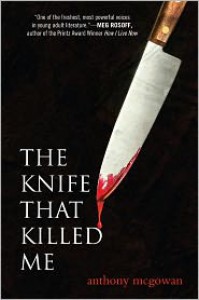
Paul is your typical, middle of the road, middle of the pack, Catholic Comp student. This makes him an easy target for the sadistic school bully Roth. His usual MO is keep your head down, ignore them, and they’ll move on. However, one day Roth turns the table and incorporates Paul into one of his evil plans. Paul soon finds himself caught between a rock and a hard place, when Roth gives him a knife for safe keeping. He must choose whether to do the right thing and risk becoming ostracized again or be one of the lads and face the consequences.
This was a really great UK YA book dealing with universal issues but it is also something that is extremely prevalent in our UK schools - if we are to believe the papers anyway. I have been out of those hallways for quite a while now so I couldn’t say for sure.
The Knife That Killed Me was a fast paced story with no frills - just some cold hard truths. The main one being, if you’ve got a weapon, you’ll probably end up using it no matter what you say. You will then have to face the consequences. This is something that needs to be hammered home over and over again to our young and vulnerable.
Anthony McGowan did a really nice job of showing the inner conflict of the average teenager through Paul. Maybe the baddie - Roth - was overly bad. Then again, we all know kids can be cruel, so maybe Roth was an accurate depiction of the noughteens (is that what we’re calling this decade?) bully? I was lucky in that my schools were never like this but I’m sure there will be many readers who can relate to Paul’s story. However, we definitely had characters like Shane and his gang at our school and a teacher eerily similar to Mrs Eel!
If I were an English or Drama teacher, I would definitely try to plan a few lessons around The Knife That Killed Me. It provides a wealth of discussion points and the twist at the end means it would stick with the students for a long time.
The Summer I Found You

Kate is finding it more than a little difficult to adjust to living with type 1 diabetes. On top of that, her boyfriend dumps her seemingly out of the blue. Nineteen year old veteran Aidan is trying to come to terms with his recent disability along with everything that comes with adapting to civilian life. The two find each other to be a satisfying distraction from their immediate problems. However, soon enough they must face said problems head on - including their true feelings for each other.
The Summer I Found You is a nice story about friendship and how the best things in life are often unexpected surprises. I truly admire Jolene Perry for tackling TWO big issues in this book.
I liked Kate and Aidan well enough. Both had been dealt a rough card, compared to other characters in the contemporary romance YA universe. However, I really liked the supporting characters best of all. Jennifer was a great example of a true best friend - she was definitely someone you would want in your corner. I liked that there was no drama between the two besties, even when Kate was acting up now and then. The families were well imagined too. Jolene Perry managed to make all of the parents sound different and you could tell that despite different parenting styles, they all wanted the best for their children. I’ve read a few pieces here and there about the absent parent syndrome that seems to infect a lot of YA - which is an interesting argument because on the one hand, your parents aren’t at school with you, so why would they be in a YA novel set at school but on the other hand, they’re often there when you get home and so forth, so why aren’t they shown in the books? - nevertheless, it was nice to have concerned and supportive families represented in The Summer I Found You because lots of people do come from such families!
It was a quick read. For the most part, I ignored the layout issues and some odd turns of phrases or clunkiness because I’m sure these were sorted out before publication. Overall, it flowed fairly well. It definitely got more complex and deep towards the end, which was satisfying. Did Aidan and Kate fall for each other too quickly? Did they suffer from a case of the old insta-luv? Well, yeah, but when you’ve got a word limit and an end goal, what are you supposed to do? Besides, they’re young!
The only thing that kept bothering me as I was reading was that it should’ve been one voice or the other. We should’ve had Kate’s story featuring Aidan or vice versa. This is because: a) we’d learn more about either Kate or Aidan’s day to day life - their coping mechanisms, more of the challenges they face and thus we’d learn more about their disease or disability; b) we would have seen more interaction with their family, friends and medical professionals. As I said, I really enjoyed these well drawn characters; and c)basically the issues were a little overwhelming to condense down like this. By having one POV over another, it would have given that character room to really breathe and expand, and so the final scenes wouldn’t seem so ‘happy ending with a bow on top - thank you and goodnight’.
Another minor issue I had was with the title. It’s a very minor issue. However, the book was not set during the summer! An actual summer setting might have added to the frustrations Aidan and Kate were feeling. I understand ‘The Spring I Found You’ isn’t very catchy but something like ‘When I Found You’ or ‘How I Found You’ or ‘You Found Me’ (since YA novels seem to like using song titles a lot). However, that’s not to say this cannot be enjoyed in the summer months. I for one would’ve probably enjoyed it even more if I’d been on holiday or something.
Overall, I liked this book more and more as I read it and I tip my hat to Jolene Perry for writing about diabetes and our wounded veterans. If you enjoyed In Honor or Something Like Normal, definitely give this one a go!
Code Name Verity

I didn't even consider writing a synopsis for Code Name Verity because I'm petrified of dropping spoilers! Although, it would've taken a lot of explaining to truly give anything away because there are so many twists and turns, which is the book's greatest strength. Usually, I read two books a week - one YA and another general fiction or non-fiction. I'll read a few chapters of one in the morning or on the train and a few chapters of the other before bed. With Code Name Verity, I read at least half of it in one sitting because I just couldn't put it down. Absolutely brilliant.
The two main characters were refreshingly original. I don't know, maybe because I don't read too much set during WWII, but I haven't come across characters like these two very often. It's quite hard to talk about them without saying their names and giving away what they do. However, even though Elizabeth Wein states at the end that they are fictional, it is easy to imagine a story like this might have occured during WWII. She even mentions a Horrible Histories episode featuring a similar figure who faced a fate not unlike one of the Code Name Verity characters, which I recalled whilst reading too. If you have never come across Horrible Histories, I would definitely recommend having a look. I've read the books since I was a child (they make great stocking fillers!) and recently enjoyed the television series.
Given the cover illustration, I don't think I'll get shouted at too much for saying the book is about the role women played in WWII. I can't really think of many instances, that I've personally come across, where this viewpoint is portrayed, except maybe Land Girls or The Night Watch by Sarah Waters, which I read when it came out because it was featured in a display at my local bookshop. I haven't seen Enigma but I'm guessing that would be one to watch after reading this book, yes? No? Anyway, I liked learning about the roles these women played and I felt so much admiration for those who did the jobs described in Code Name Verity. I kept thinking, I'm not sure I could ever do what they did but I suppose you'll never know what you're capable of until you're tested.
I'll probably try and seek out some more books like Code Name Verity. It had everything you could ever want in a story - suspense, twists and turns, humour (one character had a delightfully dry wit), and of course, given it was part of the Valentine's Reading Mutiny Challenge, love. The love binding friendships that would not have come about under different circumstances and breaking down class and social barriers; romantic love (to anyone who has read the book, did you picture Jamie Bell for a certain character?!); love for what is right and true; and love for one's country. Code Name Verity is a song to the unnamed, faceless heroes who worked in the shadows of what was already our world's darkest time to restore peace and justice. Lest we forget.
American Fraternity Man by Nathan Holic
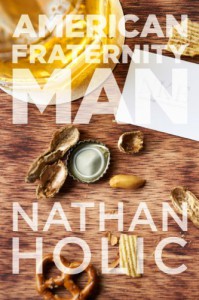
Publisher: Beating Windward Press LLC
Format: Kindle Edition
Rating: 4/5
Charles Washington, former president of his fraternity and graduate of Edison University, is on a mission. A mission to save fraternities across the land and restore them to their original purpose of safe spaces promoting brotherhood and good citizenship. However, everything from his vision to his relationships to his very moral fibre is challenged and tested as he travels the country, meeting his brothers - young and old -, and uncovers what is beneath the surface of his beloved fraternity and the Greek system as a whole.
I didn't really know what to expect when I purchased this book (at a bargain price I might add). I can't even remember how I came across it. Perhaps on a Goodreads list? Anyway, my only encounter with Greek life has been ABC's short lived series Greek. American Fraternity Man is quite different to the TV show, which is very light hearted. There are some complex themes and a depth to this book that I was pleasantly surprised by.
The story is mainly about that first year after college - the transition to adulthood. At one point, Charles quips “Finally, my life was feeling like an Outlook calendar, not a Facebook page.” (pg 83). We’ve all been there, haven’t we? That point where you suddenly feel like you’ve grown up. Then again, this 'transition' to adulthood rarely takes place within the first year of graduating because it takes more than a year to figure out who you are and where you want to go. I suppose it could be argued we are making this 'transition' constantly but...this isn't the place for that kind of discussion.
There's a great deal of thought provoking sociological discourse on the 'Millennial Generation' throughout the book. Most prominently is the thought that Millennials are pushing a compassion boom meaning they (we?!) are eschewing high paying, (formerly) high status positions in favour of poorly paid work for non-profits or organisations seeming to want to make the world a better place. Some of the theories suggest this is because Millennials have nothing to prove, per se. There was also an interesting discussion between Charles and a professor of the ‘Millennial Generation’. The professor claimed Millennials want to join every society, team, and fraternity/sorority because they “crave programming” (pg 343) thanks to helicopter parenting. In the end, for me, the debate boiled down to the Millennial Generation being, as the professor says, “A Hero Generation, capable of changing the world” (pg 338) or a directionless, lost generation run out of steam. Burnt out by 25. Unsure of what work is because a 9-5 pushing papers just isn’t fulfilling, is it? And everything else up until that point, every team, club, exam, whatever, has been for a reason - to get into university, to boost your overall grade, to put on your CV for the job...the job that turns out to not seem to have a purpose in the grand scheme of things? Or your supposed grand scheme of things. I don’t know - I’m not a scholar in this subject but that’s how it feels to me and this is my generation so...
Anyway, back to the book itself and the characters within: Charles was not your typical, flawless hero. He tried too hard and made some dodgy decisions but ultimately he felt like he was doing something he believed in and managed to dredge up enthusiasm from goodness knows where for, what seemed like, a pretty hopeless cause. I really liked Jenn because despite being physically absent throughout most of the story, she was always there in my mind. Perhaps because I’m a female reader and identified with her to a certain extent? As for Charles’s motivational speaker manager, well we could see his true nature from the very beginning, which made it even more tense when Charles figured out the long game. There were many, many supporting characters - after all, Charles had dozens of fraternities to visit - so it was clever to keep them all in check and make sure they were distinct but also keep the same types cropping up in each fraternity - the one’s like Charles, the really fratty types, the always second-in-command types, and so on.
As I said before, I didn’t know anything about Greek Life other than what I’d seen on Greek, so I cannot say whether or not this was an accurate, authentic depiction. However, the fact that I was a newbie didn’t mean the story was inaccessible to me, which is definitely a positive. Considering everything mentioned about the Millennials, it would be interesting to know if Greek membership is up or down.
There was some great stuff on social media and how it just seemed to explode. One minute people were tapping away on Livejournal and ranking friends on Myspace (which I forgot about, how mean was that?!) then BOOM Facebook arrives for the masses and Twitter and everything else. Remember how everyone had a Blackberry or a normal phone and then you blinked and suddenly everyone, including your grandma, had an iPhone? Nowadays, we all (supposedly) know what we can and cannot put out there on social media if we want to maintain our integrity but this story points out how difficult it must have been for the graduates during this time. They didn’t know their employers were onto this whole Facebook thing, so a lot of what should have been private probably ended up being seen by people who had no business looking. Charles had a bit of a love/hate relationship with Facebook. How does he keep up with his friends - and his long distant girlfriend - but also remain professional and set apart from the fraternity members he’s lecturing? If the President-to-be has Facebook, why can’t he? In this respect, the book reminded me a bit of Attachments by Rainbow Rowell, where the characters are dealing with the Millennium Bug and emailing at work.
Overall, I found this story really intriguing (can you tell by how long this review is?!). It was kind of on the long side - maybe some of the visits could’ve been cut out but then I suppose Charles’s unravelling wouldn’t be as believable. A minor complaint either way. This is definitely a read for anyone interested in Greek Life or the Millennial Generation or if you just like a good college based novel. We keep saying we need more of them, don’t we?
The One Plus One by Jojo Moyes
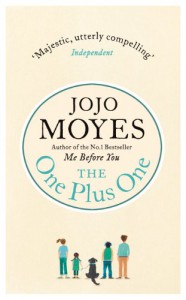
Publisher: Penguin UK
Format: Hardback copy from The Reading Room/Penguin
Rating: 4/5
Single mother Jess finds herself caught between a rock and a hard place when she comes across a wad of money belonging to the rude man occupying one of the holiday homes she cleans. Finders keepers, losers weepers, particularly when said money will be going towards Jess's gifted daughter's private school fund. However, what happens when the rude man suddenly finds his conscience and decides to help Jess during her hour of need? Does the end justify the means?
What a wonderful book! A lovely, warm story bursting with charming characters. This is the third book I’ve read by Jojo Moyes and this seems to be her shtick, which is a pretty decent shtick to have if you ask me.
The characters in this novel just jumped off the page. I love that I can always picture Jojo Moyes’ characters from just two sentences of description - and these aren’t usually physical descriptions. Sometimes you can be told every detail about how a character is supposed to look from their asymmetric bob to their Jimmy Choo stilettos but you still can’t picture them - or more importantly, get a feel for them - for love nor money. The supporting cast was very strong too - being a road trip story, there were plenty of eccentric characters dropping hilarious one-liners.
However, with regard to the main characters, Jess was a tour de force. If you liked Louisa from Me Before You, you’ll LOVE Jess. Headstrong, witty, and most importantly, full of love for her family and friends. Speaking of the family, Tanzie and Nicky were refreshingly three dimensional. I feel like the kids in these kinds of novels are always either precocious and highly intelligent - and rarely sound like children - or they’re the hurt, bullied quiet kind, used only as a device to explore ‘issues’. Yes, these tropes form part of Tanzie’s and Nicky’s story in The One Plus One but there’s so much more to them. They are most certainly kind, smart, and important (sorry - had to get that one in). Oh, and I cannot forget Norman - who was responsible for the huge lump that stuck in my throat for the last part of the book. Finally, Ed was not your typical knight in shining armour, which made the story all the better. He made some very silly decisions and followed those up with some rather childish, ‘woe is me’ type behaviour, which made him all the more accessible. Otherwise, he would’ve just been a Mr Darcy type and goodness knows we’ve had enough of those. I suppose it helped that he was a bit geeky too - being a tech entrepreneur and all. I don’t read much ‘chick-lit’ (for want of a better word) but is the tech entrepreneur the new ‘architect’ when it comes to love interests? That would make sense, given the current climate.
A number of themes were explored in The One Plus One, such as good neighbourliness (everybody needs good neighbours), selflessness, belonging, and 21st century blended family life. Oh and finding your other half, obviously. Although, I liked that Jess didn’t need to find her other half or be rescued. However, the most notable themes were: living on the bread line and our very British class system. Given all the debates that have been raging recently about ‘Benefits Street’ and our welfare system, this book couldn’t have been published at a better time. Jess is an example of what so many people are going through on a daily basis. Last year, thanks to research by The Joseph Rowntree Foundation, it was reported that “more working households were living in poverty in the UK...than non-working ones - for the first time...” . Jess had multiple jobs but still struggled due to circumstances far beyond her control. The fact that she was forced to breaking point because she only wanted the best for her children is a scenario we can all empathise with. Her actions as a result of this, and the ethical questions it posed, added depth to what could have been a fluffy, easy read. Ethics were also brought to the forefront with Ed’s story too - business ethics. Also, our class system. Thinking of the ending, if somebody from a different background did what Ed did, would the outcome have been the same?
Overall, this was another excellent work from Jojo Moyes and I look forward to catching up with all of her other books.
Paradise by Joanna Nadin
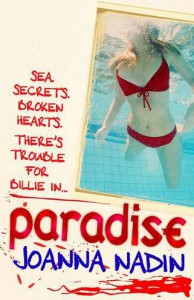
I always like these kinds of suffocating, small town with a big secret kind of books. In fact, I dare say I wish I'd written Paradise myself. It was a good length and unravelled perfectly.
Billie was a sweet, sympathetic character and I couldn't help but root for her the whole time. I just wanted her to catch a break. She was stuck playing mum but it didn't turn into a Cinderella/'oh woe is me' type story. She just got on with it and tried to do the best for her family, which was admirable. I wish there had been more about Eva and their burgeoning friendship - if that's what it was. Billie's romance did not seem too forced either. It unfurled organically but Joanna Nadin didn't dwell on it too much because it wasn't the most important love story in the book.
The water theme was appropriate as it is definitely a story of staying afloat during life's storms, rebirth, washing away the past, and starting again. The end was heartbreaking, although you kind of see it coming, however it was still a bit of a shock. It was a bit of a punch in the gut for Billie who had already been through so much but the ending had a glimmer of hope.


